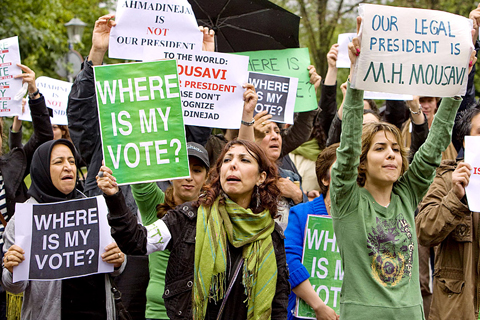How do you count almost 40 million handwritten paper ballots in a matter of hours and declare a winner? That’s a key question in Iran’s disputed presidential election.
International polling experts and Iran analysts said the speed of the vote count, coupled with a lack of detailed election data normally released by officials, was fueling suspicion around President Mahmoud Ahmadinejad’s landslide victory.
Iran’s supreme leader endorsed the hard-line president’s re-election the morning after Friday’s vote, calling it a “divine assessment” and appearing to close the door on challenges from Iran’s reformist camp. But on Monday, after two days of rioting in the streets, he ordered a probe into the allegations of fraud.

PHOTO: AFP
Mir Hossein Mousavi, Ahmadinejad’s reformist challenger, claims he was robbed of the presidency and has called for the results to be canceled.
Mousavi’s newspaper, Kalemeh Sabz, or the Green Word, reported on its Web site that more than 10 million votes were missing national identification numbers similar to US Social Security numbers, which make the votes “untraceable.” It did not say how it knew that information.
Observers who questioned the vote said that at each stage of the counting, results released by the Interior Ministry showed Ahmadinejad ahead of Mousavi by about a 2-1 margin.
That could be unusual, polling experts noted, because results reported first from Iran’s cities would likely reflect a different ratio from those reported later from the countryside, where Ahmadinejad has more support among the poor.
The final tally was 62.6 percent of the vote for Ahmadinejad and 33.75 for Mousavi — a landslide victory in a race that was perceived to be much closer. Such a huge margin also went against the expectation that a high turnout — a record 85 percent of Iran’s 46.2 million eligible voters — would boost Mousavi, whose campaign focused on young people. About a third of eligible voters were under 30.
Ahmadinejad said Sunday that the vote was “real and free” and insisted the results were fair and legitimate.
One of the central questions was how 39.2 million paper ballots could be counted by hand and final results announced by authorities in Tehran in just over 12 hours. Past elections took at least twice as long.
A new computerized system might have helped speed the process in urban centers, where most Iranians live, though it is unclear if that system was extended to every small town and village. And each ballot — on which a candidate’s name was written in — would still have to be counted by hand before any data could be entered into a computer, aggregated and transmitted to the Interior Ministry in Tehran.
Susan Hyde, an assistant political science professor at Yale University who has taken part in election monitoring missions in developing countries for the Carter Center, said that would be uncharacteristically fast.
“If they’re still using hand counting, that would be very speedy, unusually speedy,” she said.
The Interior Ministry released results from a first batch of 5 million votes just an hour and a half after polling stations closed.

Kehinde Sanni spends his days smoothing out dents and repainting scratched bumpers in a modest autobody shop in Lagos. He has never left Nigeria, yet he speaks glowingly of Burkina Faso military leader Ibrahim Traore. “Nigeria needs someone like Ibrahim Traore of Burkina Faso. He is doing well for his country,” Sanni said. His admiration is shaped by a steady stream of viral videos, memes and social media posts — many misleading or outright false — portraying Traore as a fearless reformer who defied Western powers and reclaimed his country’s dignity. The Burkinabe strongman swept into power following a coup in September 2022

‘FRAGMENTING’: British politics have for a long time been dominated by the Labor Party and the Tories, but polls suggest that Reform now poses a significant challenge Hard-right upstarts Reform UK snatched a parliamentary seat from British Prime Minister Keir Starmer’s Labor Party yesterday in local elections that dealt a blow to the UK’s two establishment parties. Reform, led by anti-immigrant firebrand Nigel Farage, won the by-election in Runcorn and Helsby in northwest England by just six votes, as it picked up gains in other localities, including one mayoralty. The group’s strong showing continues momentum it built up at last year’s general election and appears to confirm a trend that the UK is entering an era of multi-party politics. “For the movement, for the party it’s a very, very big

ENTERTAINMENT: Rio officials have a history of organizing massive concerts on Copacabana Beach, with Madonna’s show drawing about 1.6 million fans last year Lady Gaga on Saturday night gave a free concert in front of 2 million fans who poured onto Copacabana Beach in Rio de Janeiro for the biggest show of her career. “Tonight, we’re making history... Thank you for making history with me,” Lady Gaga told a screaming crowd. The Mother Monster, as she is known, started the show at about 10:10pm local time with her 2011 song Bloody Mary. Cries of joy rose from the tightly packed fans who sang and danced shoulder-to-shoulder on the vast stretch of sand. Concert organizers said 2.1 million people attended the show. Lady Gaga

SUPPORT: The Australian prime minister promised to back Kyiv against Russia’s invasion, saying: ‘That’s my government’s position. It was yesterday. It still is’ Left-leaning Australian Prime Minister Anthony Albanese yesterday basked in his landslide election win, promising a “disciplined, orderly” government to confront cost-of-living pain and tariff turmoil. People clapped as the 62-year-old and his fiancee, Jodie Haydon, who visited his old inner Sydney haunt, Cafe Italia, surrounded by a crowd of jostling photographers and journalists. Albanese’s Labor Party is on course to win at least 83 seats in the 150-member parliament, partial results showed. Opposition leader Peter Dutton’s conservative Liberal-National coalition had just 38 seats, and other parties 12. Another 17 seats were still in doubt. “We will be a disciplined, orderly